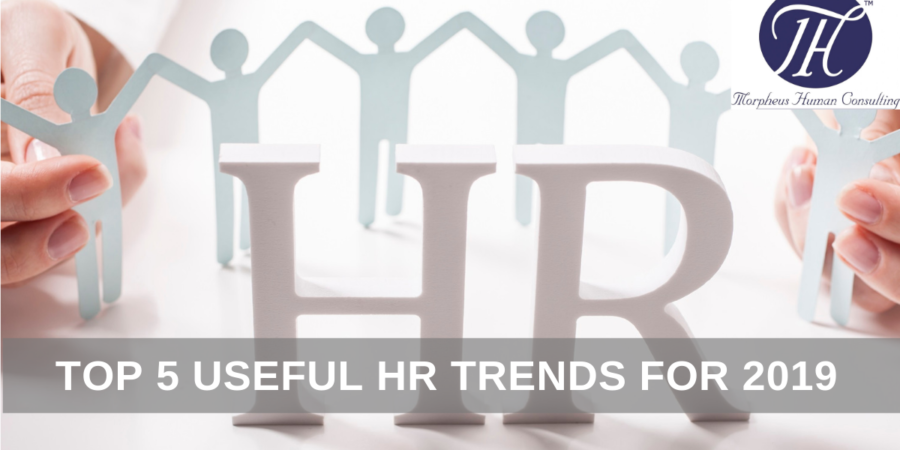Top 5 useful HR trends for 2019

1. Personalisation
Historically HR has focused very much on standardization and “One-Size-Fits-All”. Making the shift to an approach where the individual needs, wishes, and capabilities of candidates and employees are the starting point is difficult. Traditionally, many HR-practices take the needs of the organisation as the starting point. An example is recruitment we have an organisation structure, with a hierarchy, and well-defined jobs. Next step: how do we find the candidates that can fill the vacancy? Another example: most on-boarding processes are designed top-down: what do we want new employees to know when they enter the organisation? The reverse question is hardly ever asked: what can we learn from the new employees who enter the organisation?
In 2019 personalisation will get a lot of attention, and employees and organisations will benefit.
2. The Trust issue
Do people trust the organizations they work in? Do employees trust technology? Are people confident the organizations will use technology for their benefit? A recent global survey of Ernst & Young (“Trust in the Workplace“) showed that less than half of the respondents have “a great deal of trust” in their current employers, boss or team/colleagues.
trust in the workplace
The results of the annual Edelman Trust Barometer are a bit more promising: globally 72% of the employees trusted their employers “to do what is right” Trust in government and the media is a lot lower. The trust issue needs to be on the 2019 HR agenda because many of the HR initiatives are designed under the assumption that employees trust the organization and that employees trust technology. Unfortunately, the trust level might be lower than we expect.
3. Development as a service
What can we learn from football? In football some of the top players hire organizations, as Your Tactical Analyst, to help them with their development.
Your tactical analyst
The provider gathers data about the player (per match), analyses the data and sits with the player to discuss the outcomes and the lessons. The provider is there for the player, paid by the player. The club of the player is not involved. This seems to work well, although some clubs do not like it. The interests of the player (the employee) and the club (the employer) are not totally aligned. The club wants to become a champion this year. The player wants to develop into one of the most valuable strikers in the world. The interests of the service provider (Your Tactical Analyst and others) are totally aligned with those of the player. “We are here to help you to become better”.
In business life we have not seen it a lot (a bit in the executive coaching area), but we expect, and hope, it will come. We see a great perspective for data-driven “Development as a service”.
4. HR Innovation Labs
Experimenting with new technologies and new innovative HR solutions can be enhanced by installing an “HR Innovation Lab”. Big innovative organisations, as Deutsche Telekom and RABO bank, are investing in teams that focus on HR innovations and the possible applications of HR Tech. We consider this as a positive development. It is good for the organisations, as they increase the angle of the learning curve. HR tech providers benefit, as they can work with and learn from sophisticated clients. It helps HR to change the image of HR, from slow and traditional to fast and innovative.
5. No more Paternalism
Often HR takes a very paternalistic and normative approach. “Our leaders and managers should be good coaches”. “We expect our employees to take responsibility for their own development”. “You cannot opt out of life-long learning”. Coaching is a good example. It starts with the global leadership model. These models (often a circle) always contain an element like “Developing People” and/or “Coaching. As an example, below the model of Leadership USA.
Leadership Competency Model
As the reality is that many managers are not good coaches, the next step is training (mandatory). Also, HR designs a process, that forces managers to have coaching sessions with their direct reports at least twice per year. The process is incorporated in the HR System, and when a manager starts her computer in the morning, the chatbot starts talking: “Good morning Tina, it is time for your bi-annual coaching session with (terrible) Tom, I have already scheduled it. Can you please complete the following preparation form?”. This approach is cracking, as it does not work. Neither Task Oriented Tina nor Terrible Tom is happy with the process. Why force people to do things they do not like, and they are not very good at? it is time to consider other approaches.
